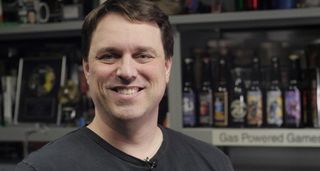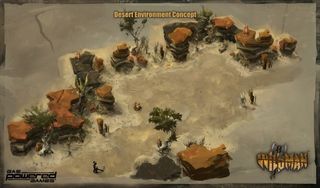Chris Taylor on Wildman: "What if I tell people my wife's gonna cut my balls off?"

Sometimes the best part of an interview comes after the interview is over, and sometimes when we say something like, "I'm gonna lead with that," we have to keep our word. I won't make you work for it: Chris Taylor's balls become fixtures in the conversation on the third page .
But first, Taylor had a essay's worth of thoughts on Gas Powered Games' new crowdfunded project , Wildman, and the rising Kickstarter island. For more about the game, read our preview and Q&A .
"We're on an island, and the water is rising in the old model."
PC Gamer: Aside from the possibility of missing your Kickstarter goal, did you have any hesitation before doing this? Any fears about crowdfunding?
Chris Taylor: Oh yeah, I use this silly analogy: we're on an island, and the water is rising in the old model. The old model, right or wrong, got us to where we are today, but the water is rising. You know, it's very, very difficult, if not downright impossible—and some of the Kickstarter videos that really exemplified it, like Brian Fargo's Wasteland 2, he talked about...it kind of pokes fun at the model.
You know, in the old days you'd walk into a publisher with a crazy idea and they'd say, “You know what? Let's at least see where this can go.” But today, that's not really possible, so... like I said, the water's kind of rising on the island, those who are standing on the driest spots are still doing well, the highest driest land, and the rest of us are up to our ankles. And we're saying, “Well, I guess we better start making iOS games, or we better start making Facebook games” or something, because the publisher is a gatekeeper between us and our customer.

And, you know, that's not a bad thing, that's just the reality of it...this is the ecosystem we've developed over the last 20 odd years in PC gaming. In this case there's another island. This other island is rising up out of the water and there's shark-infested waters between us, and that's the risk we must take: swim to that island.
"It wasn't like we choose A or B. The old model just wasn't working. It damn near was dead, to put it in so many words."
You have to sort of cast off your worldly possessions, if you will, and you have to jump into that water and swim for it, and of course there's trepidation. So, you know, in the meantime we continued to talk to a whole host of publishers about the traditional model, but what we found was that the budgets for those games was going so- it was just going straight down. They were, you know, the budgets are all turning into that- forget 10 million, forget five, it's all 500 thousand, a million, two million, in this ballpark. What's the benefit of doing those titles? You've got a publisher involved still and they're gonna recoup all their dollars and they're gonna make the profits generally...
The biggest gaming news, reviews and hardware deals
Keep up to date with the most important stories and the best deals, as picked by the PC Gamer team.
...So, long story short, Kickstarter is not just a funding source. Kickstarter is a game changer for the way we work with our customer. It's saying, “Hey, you want this game,” or “Here's a game, do you want it? If you do, back it, and let's work together on this. Let's collaborate on this game and you get what you want, and we're making games so we're happy.” ...It wasn't like we choose A or B. The old model just wasn't working. It damn near was dead, to put it in so many words.
It sounded like you went to some publishers and they might have been interested, but that you could get more money through crowdfunding?
CT: Well, that's not- I mean there's a little bit of truth to that. What we knew was is that from the last couple of years--call it four years--it was becoming progressively more difficult to sign anything new and original. It was really starting to come down to existing IP. It was coming down to iterating on sequels and things like that, or doing work for hire—working on their properties.
There were few cases where they said, “Hey, do you have a big original title you want to do? And we'll blow it out there and go big time just like the old days?” Ha, no! Definitely not! Didn't even come up in the conversation. So, last fall when Wildman was—there was the opportunity to pick up the phone, and I had one conversation, I wrote an e-mail and we had a little bit of a dialog, and I could tell just in a few exchanges that there was no appetite.
"Some [publishers] will say 'yes' when they don't even have the money in their pocket to fund the game."
I said, “Look, let's just throw the switch. Let's just go all in with Kickstarter. Let's put it all behind that, because we'll distract ourselves by running round.” You know, you call a publisher—here's the way it works—and you tell them and idea and sell them on the phone, and they say, “Well why don't you come by our office and pitch it to us?” Well, their office is in another state. You've gotta book a flight, you're gonna spend the entire day, maybe the next day, and you're gonna go to their office and show them everything you're working on, and then you leave and hope they call. You know what? Nine out of ten of those don't get call-backs.
So you have to go on this big expensive roadshow and sell something, and you know, some of them will say 'yes' when they don't even have the money in their pocket to fund the game. And they're like, “Well, there's no cost to us to sit there,” you know? So at some point, you've gotta say, “Well, that's a big expensive process for an independent developer to go through.” Plus, when someone does like it and they do want to move forward, it can be months to get the contract finalized. So, you know, we may as well go all in on Kickstarter and say, “Listen, that's the future. Let's embrace it. Let's strip down and jump in the water and swim to that island and get there. If we get there we do, if we don't we don't.”
As I like to say around here: fate can deal us the next card and we'll take our card.
On the next page: RTSes and RPGs, Wildmen and Wildwomen

Tyler grew up in Silicon Valley during the '80s and '90s, playing games like Zork and Arkanoid on early PCs. He was later captivated by Myst, SimCity, Civilization, Command & Conquer, all the shooters they call "boomer shooters" now, and PS1 classic Bushido Blade (that's right: he had Bleem!). Tyler joined PC Gamer in 2011, and today he's focused on the site's news coverage. His hobbies include amateur boxing and adding to his 1,200-plus hours in Rocket League.
Most Popular






